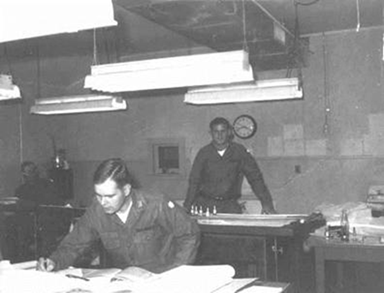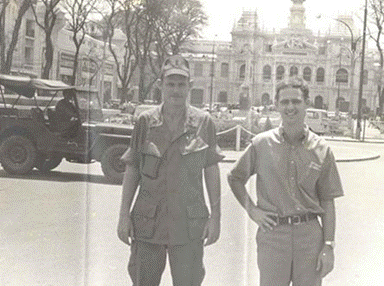| |
| |
E-Mail Forum – 2017 |
|
| |
< RETURN |
|
| |
Ken Burns Vietnam War
September 24, 2017 |
|
|
|
The Vietnam War, as seen on Ken Burns’ “Vietnam War” is focused mostly on combat of which there was plenty, of course. The sound effects are mostly gunfire and explosions. But for most of the nearly three million service members who served in Vietnam, life was mostly boredom punctuated by occasional danger and a lot of weird stuff.
Following are snippets from the experiences of several friends of mine that show the ironic and sometimes comical side of service in Vietnam
Eric Nelson, from Vermont, educated as an artist, drafted into the Army in 1968, retired as professor of art at Middlebury College in Vermont.
The U.S. Army actually assigned Eric to something he was good at. As an artist, he became an illustrator for psychological warfare (PSYOPS) media prepared in Saigon, flown to New York for printing, flown back to Vietnam, and finally dropped by planes and helicopters over areas where someone figured regretful Viet Cong would be persuaded to change their allegiance. Untold billions of those pamphlets and flyers were distributed during those war years. No one knows whether it did any good, or not. But for Eric, it was good duty.
One of the best stories I remember about Eric, who was a bit of a rogue, was his unauthorized visit to the “Coconut Monk,” a holy man based on an island (Con Phung) in the Mekong River between Ben Tre and My Tho. Ong Dao Dua, the monk, meditated on the island for three years during which time he ate nothing but coconuts. He headed his own sect, which was a bizarre mix of Christianity and Buddhism. About two weeks before his discharge, Eric asked his commanding officer for permission to make a trip to Con Phung. Because it was considered unsecure and dangerous, permission was denied.
Eric went anyway, and when he returned, he was busted to the lowest possible rank before leaving for home and leaving the Army, with a dubious reputation but with an honorable discharge.
Eric said the monk had two telephones flanking his seat, one white and the other black. When Eric asked what they were for, the monk responded, “One is a direct line to Ho Chi Minh, and the other a direct line to Richard Nixon.” He said he was in the process of brokering a peace agreement.

Figure 1 - Tom Butt, Eric Nelson and Alan Tolbert in Saigon 1969
Eric went on to become a respectable citizen, artist and academic. Recent exhibitions of his sculpture have been installed in public sculpture parks at James Madison University in Harrisonburg, Virginia; Navy Pier in Chicago; and the DeCordova Museum and Sculpture Park in Lincoln, Massachusetts. Nelson has been a visiting artist at the Edinburgh College of Art in Edinburgh, Scotland; the School of the Museum of Fine Arts in Boston; Trinity College in Hartford, Connecticut; and the Vermont Studio Center in Johnson, Vermont. He has been awarded residency fellowships at Moulin a Nef in Auvillar, France; the Virginia Center for the Creative Arts in Sweet Briar, Virginia; and Sculpture Space, Inc., in Utica, New York. He has received two fellowships from the Vermont Council on the Arts and the Albert Jacobson Memorial Award at the Silvermine Guild Arts Center in New Canaan, Connecticut.
For more, see http://www.tombutt.com/forum/2012/120401.htm.
Bill Dorn, from Texas, attended Texas A&M with a degree in Aerospace Engineering, Commissioned an Air Force Officer from ROTC, flew C-123s and C-140s in Vietnam, retired.
Bill reminds me of Yossarian in Catch-22. Bill recalled that on his way to Vietnam, he stopped over at Clark Air Force Base in the Philippines where all the pilots were required to take a week long escape and evasion and jungle survival course before going in-country. Bill is kind of a slow moving, tall and lanky guy and not one to get out front, so when he reported for jungle school, he was among the last to come into the assembly room and took a seat in the back. As the pilots lined up to check in, Bill was in the end of the line and found that by the time he got to the sign-up place, the course was full, and he was told to come back next week.
After a week of partying with stewardesses in the officers club, Bill reported again and this time made it a point to sit in the back of the room. Once again, the course filled up before he was able to sign up, and Bill was passed over. Back to the party.
By that time, he had the scam down. But after three weeks of delays and hard partying, his commander sent word that Dorn better finish jungle school and get to Phan Rang, or else.
Finally, Bill reported in to Phan Rang, as luck would have it, just before the Tet holiday in 1969. His first night was marked by a Viet Cong attack on the base that breached the wire and was repulsed only with a significant effort. When the rockets started coming in, he strapped on his only weapon, his pilot’s issue .38 and ran for the bunker barefoot in his skivvies. A great start.
Finally, Bill recalled the day his crew exceeded their maximum flying hours and were ordered to lay over on Vung Tau for the night instead of returning to Phan Rang. The entire crew got drunk and rowdy and were jailed by the MPs. Finally the wing commander tracked them down and sprung them just in time to take off for their next mission.
For more, see http://www.tombutt.com/forum/2012/120425b.htm
Bernard Horstmann, from Germany, Hong Kong and New York, drafted into the Army in 1968, retired, living in Munich
New York, 1968. Bernhard Horstmann was beginning a career as a 25-year old wine merchant living in New York City when he was drafted. As a German citizen, Bernhard didn’t have to serve; he could have simply returned to Germany.
But he decided to take the plunge. He quit his job, sold his car and moved out of his apartment, taking government provided transportation to Ft. Gordon, GA, to report for basic training.
At Ft. Gordon, he was summoned for an interview with an intelligence officer. Was he born in China? Yes. Had he ever traveled to East Germany? Yes he had. Was he a communist sympathizer? Of course not. Did he have a security clearance or other proof of non-communist sympathies? He did not.
Bernhard was excused and sent back to New York where he had to beg to get his job back and found temporary lodging in a cheap motel.
Just when things were getting back to some semblance of normal, Bernhard got a second draft notice. Apparently, the Army had investigated him and found him to be a thoroughly red-blooded American of German citizenship.
The last thing his boss advised him before he left again for Ft. Gordon was “Don’t ever volunteer for anything.”
Back to Ft. Gordon.
So, only a few days into basic training, it appears that the entire Army cooking staff had been snatched away for duty in Vietnam. “Anybody have cooking experience?” the drill sergeant asked. Forgetting the recent advice about volunteering, Bernhard stepped forward along with six others. Five of them described their meager experience with McDonald’s and other fast food restaurants, but Bernhard, wanting to set himself apart from the crowd, lied that he had been a sous-chef at the Waldorf Astoria.
Next thing he knew, he was in full charge of the mess hall. Bernhard actually had no professional cooking experience, but he found the Army had manuals with detailed recipes for everything. If you could read it, you could cook it.
So Bernhard spent his entire basic training as a chef. Never had KP; never went to the rifle range; never had to march.
He also took the standard proficiency test, scoring high with fluency in three languages and typing speed of 80 words per minute.
But the Army needed more soldiers in Vietnam, so Bernhard had to end his career as an Army chef and head into the unknown.
Now I have to back up here and provide some more context.
Bernhard was born in China to a mother who was the daughter of missionaries and a father who was a German banker. His mother’s father was Chinese. Just before the Communists took over in 1949, Bernhard’s parents divorced, and his mother, then single with four children, had to flee, ending up temporarily in Thailand.
Charlotte Horstmann eventually moved to Hong Kong, where Bernhard received his early schooling. Later, he attended boarding school in Germany while his mother became a highly successful dealer in Chinese antiquities in Hong Kong. Her shop was a “don’t miss” destination for stars, politicians, business magnates and high-ranking government officials from around the world. Click here for a 1982 article in the New York Times.
Eventually, Bernhard moved to New York, where we began this tale in 1968.
Now, back to Vietnam.
In 1969, Bernhard found himself at the replacement depot at Long Binh, sitting around waiting for something to happen. He remembered another piece of advice his boss gave him. “Always look busy doing something, or they will tap you for something you don’t want to do.” This time he took it. So Bernhard grabbed a broom and started cleaning up the depot. As his fellow soldiers lounging around were commandeered for combat duty, Bernhard worked even harder. A man with a mission.
Finally, he was the only one left, and a sergeant asked to see his 201 file. Struck by the 80 words per minute typing skill, the sergeant whisked Bernhard off to Saigon where he was assigned to some obscure unit that seemed to do nothing but create paperwork.
Now it came to pass that as various war correspondents, diplomats and other officials visited Charlotte’s (Bernard’s mother) shop in Hong Kong, she urged them to be sure and check on Bernhard when they passed through Saigon. Almost everybody important passed through Saigon in those days.
So it wasn’t long before the sergeant overseeing Bernhard’s paper mill got a phone call from the American Embassy. “Horstmann,” he yelled, “you have phone call.” No E4 got a phone call in those days. It turned out to be the ambassador with an invitation to an Embassy party. “Do you have a suit and tie,” the diplomat asked. Somehow, Bernhard found a suit and began a pattern of attending events and participating in social activities, including membership in the exclusive Circle Sportif Tennis Club, that any other E4 could not have imagined in his wildest dreams.
Resentment, however, began to build up with the lieutenant who commanded Bernhard’s unit, and Bernhard became the target of abuse. “What did you do then,” I asked Bernhard a few days ago when he was retelling this story.
“I called my mother.”
Bernhard was transferred to another unit and treated with more respect.
For more, see http://www.tombutt.com/forum/2012/121215e.html
Alan Tolbert, from Tennessee, graduated from University of Tennessee with a Master’s Degree in City Planning, drafted into the Army in 1968, retired.
Alan and I had been at Ft. Polk, LA, together in 1968. I was a basic combat training officer, and Alan was a trainee. Neither of us were enjoying our assignments.
It seems that in late 1968, there was a movement to make Ft. Polk a “permanent” installation. It had been built quickly in WWII as a sprawling training facility of mostly one and two-story wood frame buildings not expected to last more than five years. My father had been there briefly in WWII during the “Louisiana Maneuvers.” More than 20 years later, it was still buzzing with activity, having become known as the “last stop before to Vietnam.”
Becoming a “permanent” post would mean lots of money for the local economy and a boon to local politicians. Someone decided that the road to permanency required a “master plan team.” The word went out for architects, engineers and planners.

Figure 2 - Ft. Polk Master Plan Team hard at work
Alan Tolbert had a master’s degree in City Planning from the University of Tennessee, and, of course, I had a degree in architecture. We both applied and found ourselves part of the brand new Ft. Polk Master Plan Team. We had no idea what we were doing, but we were treated like
After a couple of months, we all got orders to Vietnam, but our civilian overseer was well-connected politically and informed the local congressman that our mission was vital to national defense, not to mention the future economy of central Louisiana and the congressman’s chances for reelection. Some kind of congressional action ensued (we were told it was an investigation), and our orders were postponed for three months.
Eventually, however, the needs of the war surpassed the need for Ft. Polk’s Master plan Team, and we all found ourselves in Southeast Asia.
Alan’s first assignment was quite a comedown. He was assigned to drive the jeep of a lieutenant who didn’t seem to have anything to but drive around the Saigon area. But Alan, ever alert for advancement opportunities, somehow got himself assigned to the mayor of Saigon as a city planner. No one seemed to know what he was supposed to do, but he was assigned an office and a secretary. He was also allowed to trade his uniform for civilian clothes.
Taking advantage of the apparent absence of a superior to report to in the organization chart of his murky assignment, Alan drew up a list of 30 plausible activities in which he could conceivably be engaging and gave them to his secretary. “If anyone calls or comes looking for me,” he told her, “go down the line to the next activity and tell them that is what I am doing today.” When the entire list had been exhausted, the idea was simply to start over. For example, Alan might be “inspecting bridges in Thu Duc” on Monday or “surveying traffic patterns in Binh Thanh” on Tuesday. Remember, this was in the days before cell phones, so no one could check. A modest gratuity to the secretary sealed her loyalty and made her a willing co-conspirator. Now, neither of them had any work they had to do.
But after a short time, no one even knew Alan was there or cared. No one came looking for him.

Figure 3 - Tom Butt and Alan Tolbert, Saigon, 1969
For the rest of his tour, Alan was a free agent. A “tourist” stuck in Saigon with no schedule and no responsibilities. With little money but an impressive job title, a gift of gab and nothing else to do, Alan gravitated to leisure class activities where he could meet interesting people and
When I later looked up Alan in Saigon, he and Bernhard, along with another friend, had pooled their money to rent a modest apartment where they could hang out and entertain.
For more, see http://www.tombutt.com/forum/2016/16-5-30.html
|
| |
< RETURN |
|
|

